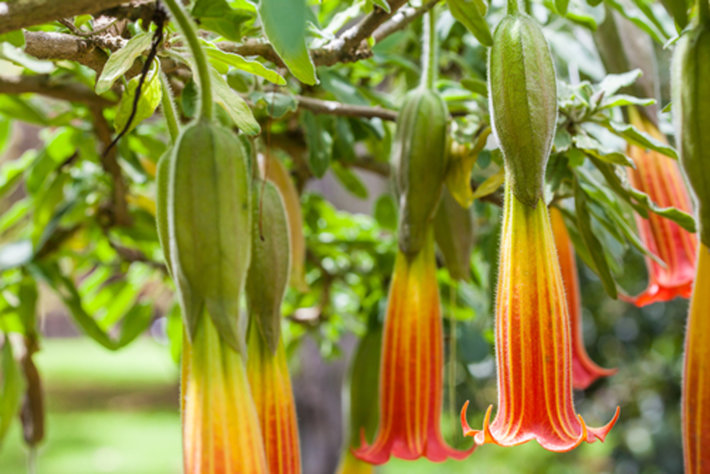Devil’s Breath in the United States

The deceptive, or problematic part of the Borrachero tree, which blooms with beautiful white, red and yellow flowers is that it produces a drug so hazardous that the drug eliminates free will and can wipe the memory of its victims. The drug is called scopolamine, however, it’s earned the nickname from its victims, “Devil’s Breath.”
Medical experts say that even a gram of powder is enough to kill, while lower quantities can result in hallucinations and victims experience a hypnotized condition that leaves them completely vulnerable to suggestions such as take me back to your house, or give me all the money in your bank account; all while the victim has no memory of what happened.
The United States Embassy gave this warning to travelers in Colombia:
“The Embassy continues to receive reports of criminals using disabling drugs to temporarily incapacitate tourists and others. At bars, restaurants, and other public areas, perpetrators may offer tainted drinks, cigarettes, or gum. Typically, victims become disoriented or unconscious and are thus vulnerable to robbery, sexual assault, and other crimes. Avoid leaving food or drinks unattended at a bar or restaurant, and be suspicious if a stranger offers you something to eat or drink.”
The U.S. State Department issued a similar warning in Thailand:
There have been occasional reports of prostitutes or bar workers drugging people with the powerful sedative scopolamine in order to rob them. Tourists have also been victimized by drugged food and drink, usually offered by a friendly stranger who is sometimes posing as a fellow traveler on an overnight bus or train. In addition, casual acquaintances you meet in a bar or on the street may pose a threat. You should not leave drinks or food unattended and should avoid going alone to unfamiliar venues.
In another article written by dailymail.co.uk, one U.S. resident in Colombia told how he woke up in the morning, having met some locals in a bar the night before, to find his expensive apartment had been emptied of everything he owned. When he asked the doorman on his apartment block what had happened, the American was told that he had himself helped a group of men load up a van with all his possessions—all the while under the influence of the drug. The victim had no recollection of this whatsoever.
Yet, we shouldn’t kid ourselves about the drug and its relevance in the United States. Scopolamine is uncontrolled in the United States and in fact, you can purchase the drug online for about 18 dollars a gram. The drug also grows from the jimsonweed plant found in Wyoming, and other parts of the United States, we’re just simply lucky that this drug hasn’t become more common on the streets.
Approved by the Food and Drug Administration (FDA) in 1979, scopolamine has also been prescribed “off-label” for asthma, depression, as a smoking-cessation remedy, and to relieve nausea that accompanies chemotherapy.
According to webmd.com, “Off-label” means the medication is being used in a manner not specified in the FDA’s approved packaging label, or insert. Every prescription drug marketed in the U.S. carries an individual, FDA-approved label. As well, the FDA does not have the legal authority to prevent the practice of a physician prescribing a drug off-label.
Common Side Effects of Scopolamine
- Sleepiness
- Dizziness
- Restlessness
- Blurred vision
- Dilated pupils
- Dry or itchy eyes
- Constipation
- Decreased sweating
Serious Side Effects
- Itching or hives, swelling in your face and hands or swelling or tingling in your mouth or throat, chest tightness, difficulty breathing—these can be signs of an allergic reaction
- Blurred vision or difficulty speaking (eye pain or redness, seeing halos around lights, blurred vision, increased sensitivity to light, hallucinations, unusual thoughts or behaviors)
- Flushing or redness on your face, neck, arms or upper chest
- Rapid heartbeat
- Confusion, or behavior changes
- Difficulty urinating
- Dilated pupils, accompanied by pain and redness of the eyes
Vomiting, dizziness, headaches, and clumsiness can occur if you’ve taken scopolamine for more than a few days and then stop taking it.
